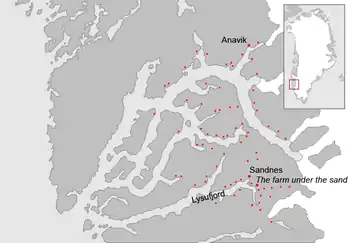Sandnæs
Sandnæs, often anglicized as Sandnes, was the largest Norse farmstead in the Western Settlement of medieval Greenland.[1] Similarly with the Norwegian city of Sandnes, its name meant "Sandy Headland" in Old Norse. It was settled around AD 1000[1] and abandoned by the late 14th century. It was located at the site known as Kilaarsarfik[2] today,[3] at the head of the Ameralla Fjord south of modern Nuuk's peninsula.

The farm was well-placed and possessed a large pasturage enabling its proprietors to successfully raise cattle, compared with goats and sheep at the other Western Settlement farms. It also included the area's church.[3] However, the conditions throughout the site's existence were apparently filthy.[4]
The site has been excavated, proving among other things that the Vikings continued to trade with the American mainland after Leif Ericson's failed colonization attempt.[5] An arrowhead likely from the Point Revenge culture of native Americans in Labrador has been found in the graveyard at Sandnæs.[6] There is also evidence of iron extraction at the site.[7]
References
- Miller, Barbara. "The History and Development of the Needle Case Archived 2012-09-13 at the Wayback Machine". Accessed 16 May 2012.
- Spelled Kilærsavik before the introduction of home rule in 1979.
- Enghoff, Inge B. Meddelelser om Grønland: Man and Society 28: "Hunting, Fishing and Animal Husbandry at the Farm Beneath the Sand, Western Greenland". Museum Tusculanum Press, 2003.
- Buckland, P.C. & al. "Bioarchæological and Climatological Evidence for the Fate of the Norse Farmers in Medieval Greenland". Antiquity 70 (1996), 88–96. Accessed 16 May 2012.
- Guðrún, Anna & al. Sailing West to Vinland. "Archaeological finds in Greenland Archived 2016-04-01 at the Wayback Machine". Accessed 16 May 2012.
- Smithsonian Museum of Natural History. The Viking Voyage. "Markland and Helluland: Archaeology". Accessed 16 May 2012.
- Nielsen, Niels. Meddelelser om Grønland: "Evidence of iron extraction at Sandnes, in Greenland's west settlement". C.A. Reitzel (Copenhagen), 1936.
